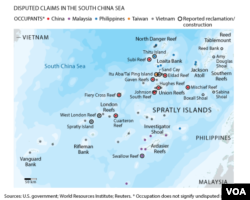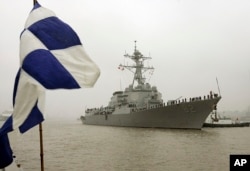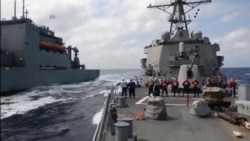A senior U.S. military official said the United States will continue to fly, sail and operate whenever and wherever international law allows, including the South China Sea. The remarks, by U.S. Pacific Command Commander (PACOM) Admiral Harry Harris, follows a media report that the U.S. Navy plans to conduct regular patrols near contested islands claimed by China.
Harris' remarks, at the Stanford Center at Peking University in the Chinese capital Tuesday, follow last week’s mission by the guided-missile destroyer USS Lassen to sail within 12 nautical miles of an artificial island constructed by China in the contested Spratly Islands.
China summons US ambassador
It was seen as a direct challenge to China, which lodged a protest with the U.S. ambassador. Last week, China’s top naval official, Admiral Wu Shengli, criticized the patrol as dangerous and provocative and one that could spark a conflict.
Harris, in Beijing for talks with his Chinese counterparts, said such routine operations should never be construed as a threat to any nation, but serve to protect the rights, freedoms and lawful use of the sea and airspace guaranteed to all nations. He restated U.S. policy that Washington takes no position on competing claims to land features in the South China Sea.
China claims sovereignty over most of this vital waterway, a claim Harris called "ambiguous."
During talks in Seoul Monday with Defense Secretary Ash Carter, South Korea’s Defense Minister Han Min-goo said the South China Sea is very important to his country as it ships one-third of its exports and most of its imports and energy across the waterway. He said freedom of navigation and flight should be ensured and called for early agreement on a code of conduct.
Regular patrols
Reuters quotes a U.S. Navy official as saying the US plans to conduct regular patrols on the contested waters ‘about twice a quarter or a little more than that.’ The official, who spoke on condition of anonymity, said that’s the right amount to make it regular, but not a constant poke in the eye.’
Deputy U.S. National Security Adviser Ben Rhodes, speaking at a defense summit in Washington Monday, said much the same thing:
"There will be more demonstrations of our commitment to freedom of navigation," Rhodes reiterated. "That’s our interest there. It’s not to say that one country has an appropriate claim and another one doesn’t, it’s to demonstrate that we will uphold the principle of freedom of navigation."
Rhodes said the goal is to have a diplomatic and multilateral framework to resolve the issue.
"One, so that you have a code of conduct between China and ASEAN, the Association of Southeast Asian countries, to avoid inadvertent escalation, (to) have dialogue and, two, that you move these disputes over territory into international forums that can resolve maritime claims," he said.
Asked if such patrols run the risk of a confrontation with China, Rhodes acknowledges it is a balancing act.
"Again, we have to demonstrate our commitment to certain international principles," Rhodes said. "We have to demonstrate in this part of the world you’re not just going to have a situation where a bigger nation can bully a smaller nation on an issue like a territorial claim. On the other hand, you don’t want to provoke a conflict yourself."
Deliberate, transparent approach
Rhodes described the U.S. approach as very deliberate, measured and transparent. Both he and Harris emphasized the need for continued dialogue with Chinese officials.
Security analyst Denny Roy of the Hawaii-based East-West Institute acknowledges finding the right balance for such U.S. patrols will not be easy.
"Any response at all on the part of the United States will anger the Chinese, of course. Any gestures beyond zero have a cost to pay in US/China relations," Roy said. "But, at the same time, too light of a response on the part of the United States maybe shakes the confidence of U.S. friends and allies that the United States is fully committed to backing up the international system in the region.
"The best possibility here is that both sides become accustomed to an ongoing arrangement," he added. " If the visits are handled about the same way by both sides each time and can get a stabilization effect similar to what took place during the Cold War when the United States and the Soviet Union played these sorts of games."
Roy says such missions carry the risk of miscalculation and a potential loss of life, but adds that risk of non-action is also high. He says the hope remains that both sides will seek restraint since neither wants an incident.
Roy also sees that situation as a victory for China as it continues to modestly increase its strategic presence in the region. He says U.S. patrols won’t change the fact that China’s claims are unlikely to be reversed.
WATCH: US Ship in S. China Sea
















